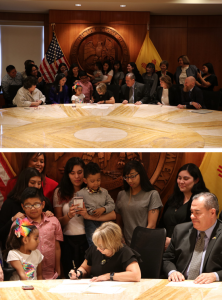For Immediate Release: Nora Meyers Sackett, Press Secretary,
Office of the Governor
03.06.2020

FOR IMMEDIATE RELEASE
Contact: Nora Meyers Sackett Press Secretary, Office of the Governor
Press Secretary, Office of the Governor
nora.sackett@state.nm.us
(505) 690-7313
March 6, 2020
SANTA FE – Gov. Michelle Lujan Grisham on Friday signed into law three bills to support New Mexico children and young adults. All three measures passed both the House and Senate unanimously.
“This administration and this Legislature agree that taking care of children, especially our most vulnerable children, is Job No. 1,” Gov. Lujan Grisham said. “Anything the state can do to ease the burden on children in foster care or those aging out of it, we will do.”
- Senate Bill 130, sponsored by Sen. Linda Lopez, makes it easier for students who have had to change schools because of a change in foster care placement, homelessness, or other reasons outside of the youth’s control to still get partial credit for work completed before the transfer;
- Senate Bill 146, sponsored by Lopez and Rep. Susan Herrera, allows the state to give more support to extended family and kinship caregivers;
- Senate Bill 168, sponsored by Sens. Michael Padilla and Candace Gould, makes technical fixes to New Mexico’s Extended Foster Care Act, which provides vital support up to age 21 for young people who have been in out-of-home placements.
“These bills will allow us to support children and young people in New Mexico in new and critical ways,” said Brian Blalock, cabinet secretary for the Children, Families and Youth Department. “The well-being of our New Mexico’s children is at the foundation of a strong state. These bills will allow us to meet the needs of some of New Mexico’s most impacted young people by meeting them where they are and creating solutions hand-in-hand with our youth and New Mexico families.”
Senate Bill 130 requires that students who have completed course work prior to transferring to another public school receive credit for that course work, even if a grading period has not occurred.
Young people in the child welfare system experience more moves than their peers, and moves often result in lost credits when they occur outside normal breaks in the school year. As a result, these children have significantly lower graduation rates.
A joint task force established by the state Supreme Court proposed in 2012 that state law be amended to allow for partial credit.
Senate Bill 146 allows CYFD to support more extended family and kinship caregivers.
Currently, half of all kinship guardians caring for children in the CYFD system are not eligible for financial support due to archaic rules established by the federal government in 1996. This bill allows more foster children to safely move from foster care to guardianship while still accessing supports from CYFD.
This bill also allows youth who are formally involved with CYFD to move directly to a subsidized guardianship, thereby avoiding unnecessary removals to foster care.
Senate Bill 168 makes important changes to New Mexico’s extended foster care program, which helps 18- to 21-year-old clients adjust to independence after living in out-of-home placements.
The changes ensure the availability of federal funding for these young people and give the state additional flexibility in administering the best program possible.
Young people who are exiting care need age-appropriate supports and opportunities to succeed in the transition to adulthood. Extended care provides these young people more time to finish school, learn increased responsibility, develop skills to be successful adults and build supportive networks and social capital.
###
